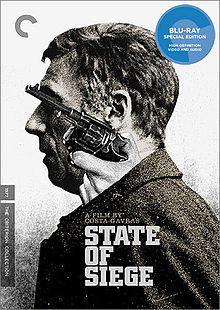| State of Siege (État de Siège) | |
|---|---|
 | |
| Directed by | Costa-Gavras |
| Produced by | Jacques Henri Barratier Léon Sanz |
| Written by | Franco Solinas Costa-Gavras |
| Starring | Yves Montand Renato Salvatori O.E. Hasse Jacques Weber |
| Music by | Mikis Theodorakis |
| Cinematography | Pierre-William Glenn |
| Edited by | Françoise Bonnot |
| Distributed by | Cinema 5 Distributing |
Release date | 1972 |
Running time | 121 minutes |
| Country | France |
| Language | French English |
| Box office | $8 million[1] |
State of Siege (French: État de Siège) is a 1972 French film directed by Costa-Gavras starring Yves Montand and Renato Salvatori.
Summary
Yves Montand plays Philip Michael Santore, an official of the United States Agency for International Development (an organisation sometimes used as a front for training foreign police in counterinsurgency methods). Posted to Uruguay in the early 1970s, Santore is kidnapped by a group of urban guerrillas. The story is based on an actual incident in 1970 when U.S. Embassy official Dan Mitrione was kidnapped and killed.[2]
Using Santore's interrogation by his captors as a backdrop, the film explores the often brutal consequences of the struggle between the repressive government of Montevideo and the leftist Tupamaro guerrillas. Using death squads, the government decimates the revolutionary group, whose surviving members vote to execute the smugly calculating Santore, who is accused of arranging training in torture and political manipulation. In the finale a replacement U.S. official arrives, watched from the crowd by a defiant and angry survivor of the radical group.
Cast
- Yves Montand as Philip Michael Santore
- Renato Salvatori as Captain Lopez
- O.E. Hasse as Carlos Ducas
- Jacques Weber as Hugo
- Jean-Luc Bideau as Este
- Maurice Teynac as Minister of Internal Security
- Yvette Etiévant as Woman Senator
- Evangeline Peterson as Mrs. Santore
- Harald Wolff as Minister of Foreign Affairs
- Nemesio Antúnez as President Jorge Pacheco Areco
- Mario Montilles as Assistant Commissioner Fontant
- André Falcon as Deputy Fabbri
- Jacques Perrin as Telephone Operator
- Juan Guzmán Tapia as Journalist (uncredited)
Response
The film opened to positive reviews from critics and is regarded as one of Costa-Gavras' finest works since the 1969 film Z. While it was released one year later in American theaters, a storm of controversy developed. Many U.S. officials hated the movie and even stated that it was a heap of lies about U.S. involvement in Latin America and other third world countries. In Washington, D.C., it was removed from a special screening at the John F. Kennedy Center,[3] only to be run uncut on a local TV station.
Production
Cinematography
Though the setting of State of Siege is never explicitly named, it clearly takes place in Uruguay, as signage throughout the film refers to Montevideo and the Tupamaros are a major plot element. However, it could not be filmed there due to its political content. Instead, it was filmed in Chile, in and around Santiago, and in the coastal cities of Valparaíso and Viña del Mar.[4] The movie was filmed during the brief democratic socialist rule of Salvador Allende, just before the 1973 Chilean coup d'état, which Costa-Gavras would dramatize in his later film Missing. That other film is actually set in Santiago and Viña del Mar, but had to be filmed in Mexico City and Acapulco due to its own political content.
Music
Mikis Theodorakis used the same melodies that he later used in Canto General.
References
- ^ "Etat de siège (1973)". JPBox-Office. 1973-02-07. Retrieved 2019-04-14.
- ^ Danner, Mark (2015). "Their Torture, and Ours". State of Siege (Blu-ray disc liner essay). Criterion Collection No. 760. New York: Criterion Collection. ISBN 978-1-60465-982-5.
- ^ Miller, Michael R. (18 April 1973). "State of Siege: Undesirable". The Cornell Daily Sun. 89 (129). Cornell University Library. Retrieved 16 April 2014.
- ^ "State of Siege (1972): Filming & Production". IMDB.
Further reading
- Costa-Gavras & Solinas, Franco (1973). State of Siege. London: Plexus Publishing. ISBN 0-85965-003-0.
External links
- State of Siege at IMDb
- Review of the movie by Roger Ebert